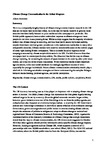Climate Change Communication in the United Kingdom
| dc.contributor.author | Anderson, Alison | |
| dc.date.accessioned | 2018-08-21T15:11:12Z | |
| dc.date.issued | 2019-02 | |
| dc.identifier.uri | http://hdl.handle.net/10026.1/12182 | |
| dc.description.abstract |
There is a comparably lengthy history of climate change communication research in the UK that can be traced back to the late 1980s. As is the case for media research in general, most attention has historically focused on print media and elite newspapers in particular. The British public appears to have a rather ambivalent response to climate change and most people do not view it as a pressing threat. Whilst surveys suggest that the majority of citizens believe that climate change is occurring, and is at least partly caused by human activity, sceptic views have received greater prominence in the mainstream media than in many other comparable countries. Climate deniers have received considerable space on the opinion pages of some right-leaning British newspapers. This is no doubt linked to vigorous denial campaigns mounted by climate sceptic think tanks in the UK. The left-of-centre Guardian newspaper (and its counterpart Sunday edition, The Observer) has led the way on climate change reporting, far exceeding the amount of space devoted to the topic by other print news outlets, yet it has one of the lowest readerships. While traditional media remain important agenda-setters, online and social media are increasingly significant sources of news - especially for younger individuals. Future climate communication scholarship should play a vital role in informing stakeholder strategies and better understanding the complex linkages between media framing, political agendas, and public perceptions. | |
| dc.language.iso | en | |
| dc.publisher | Oxford University Press | |
| dc.subject | Climate change | |
| dc.subject | Communication | |
| dc.subject | UK | |
| dc.subject | Media | |
| dc.subject | Public opinion | |
| dc.subject | Scepticism | |
| dc.subject | Brexit | |
| dc.title | Climate Change Communication in the United Kingdom | |
| dc.type | journal-article | |
| plymouth.publication-status | Published online | |
| plymouth.journal | Oxford Research Encyclopedia of Climate Science | |
| dc.identifier.doi | 10.1093/acrefore/9780190228620.013.458 | |
| plymouth.organisational-group | /Plymouth | |
| plymouth.organisational-group | /Plymouth/Admin Group - REF | |
| plymouth.organisational-group | /Plymouth/Admin Group - REF/REF Admin Group - FoAH | |
| plymouth.organisational-group | /Plymouth/Faculty of Arts, Humanities and Business | |
| plymouth.organisational-group | /Plymouth/REF 2021 Researchers by UoA | |
| plymouth.organisational-group | /Plymouth/REF 2021 Researchers by UoA/UoA20 Social Work and Social Policy | |
| plymouth.organisational-group | /Plymouth/Research Groups | |
| plymouth.organisational-group | /Plymouth/Research Groups/Institute of Health and Community | |
| plymouth.organisational-group | /Plymouth/Research Groups/Marine Institute | |
| plymouth.organisational-group | /Plymouth/Users by role | |
| plymouth.organisational-group | /Plymouth/Users by role/Academics | |
| dcterms.dateAccepted | 2018-08-06 | |
| dc.rights.embargodate | 2020-2-1 | |
| dc.rights.embargoperiod | Not known | |
| rioxxterms.versionofrecord | 10.1093/acrefore/9780190228620.013.458 | |
| rioxxterms.licenseref.uri | http://www.rioxx.net/licenses/all-rights-reserved | |
| rioxxterms.licenseref.startdate | 2019-02 | |
| rioxxterms.type | Journal Article/Review |


